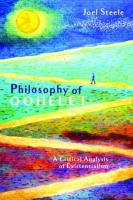Joel Steele’s Philosophy of Qohelet utilizes comparative literature on secular philosophic ideology to demonstrate that humanity’s inherent meaning is inefficient without an eternal guide. The reality of the human condition and the ability to find purpose for one’s life is brought into focus through the lens of Qohelet (Ecclesiastes) via exploration of various engagements on earth that all seem to have little significance—vanity.  FOR IMMEDIATE RELEASE / PRURGENT
San Diego, California – 4/22/2021 - This research compares and contrasts various existential philosophies pertaining to the human condition and its purpose. It specifically focuses on an Old Testament book—Ecclesiastes exposing the objectifiable source for the essence behind the philosophy. A linguistic approach combined with known historical conquests was used to argue against Greek influences on the Hebrew text of Ecclesiastes. Original sources were extracted from ancient writings to disclose existential arguments. Key word studies demonstrate the origination of translated words and their meanings within the context of passages. Nicomachean Ethics and The Nature of the Gods regarding virtue, courage, and the necessity of an eternal source were examined as they relate to the subject from a Western worldview.
“To escape vanity something eternal must exist. Nevertheless, humanity must confront the abyss that Nietzsche struggled with in his version of existential philosophy to find meaning in this life. Indeed, when gazing into an abyss the abyss gazes back into humanity, but rather than surrendering one’s autonomy to the meaningless void, individuals should determine the inherent value of their life. Otherwise, death, as Qohelet recognized, has a grip on the individual long before they actually die.” ~Joel Steele
The book is available at Amazon, Barns & Noble, and most book stores. |